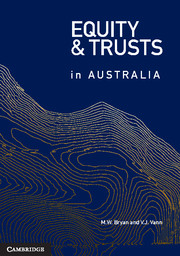Book contents
- Frontmatter
- Contents
- Preface
- Table of Cases
- Table of Statutes
- Abbreviations
- Part A Introduction
- Part B Equitable Remedies
- Part C Equity, Contract and Property
- Part D Equitable Obligations
- Part E Express Trusts
- Part F Performing the Trust
- Part G Breach of Trust
- Part H Non-Consensual Trusts
- 22 Resulting Trusts
- 23 Constructive Trusts
- Index
- References
22 - Resulting Trusts
from Part H - Non-Consensual Trusts
- Frontmatter
- Contents
- Preface
- Table of Cases
- Table of Statutes
- Abbreviations
- Part A Introduction
- Part B Equitable Remedies
- Part C Equity, Contract and Property
- Part D Equitable Obligations
- Part E Express Trusts
- Part F Performing the Trust
- Part G Breach of Trust
- Part H Non-Consensual Trusts
- 22 Resulting Trusts
- 23 Constructive Trusts
- Index
- References
Summary
Introduction
Resulting trusts arise where property is disposed of in circumstances in which a provider of property does not intend to confer a beneficial interest on the recipient. The recipient holds the property on trust for the provider. The property is said to ‘result back’ to the provider.
Resulting trusts differ from express trusts in that an express trust gives effect to the settlor's positive intention to benefit another by way of trust, whereas a resulting trust gives effect to the provider's negative intention – an intention not to make the recipient the beneficial owner of that property. The resulting trust resembles a constructive trust in that it arises by operation of law but differs in that its imposition can be rebutted by evidence that the provider intended to confer a beneficial title to the property on the recipient.
Resulting trusts are said to be either ‘presumed’ or ‘automatic’. Presumed resulting trusts can be rebutted by evidence that the provider of the property intended to make a gift to the recipient. There are two types of presumed resulting trust.
(1) A ‘purchase money’ resulting trust. If P purchases property in the name of D equity presumes that D holds the property on trust for P.
(2) A ‘voluntary transfer’ resulting trust. If P voluntarily transfers property to D equity presumes that D holds the property on resulting trust for P. Legislation in some jurisdictions has abolished the application of the voluntary transfer resulting trust to land.
- Type
- Chapter
- Information
- Equity and Trusts in Australia , pp. 372 - 388Publisher: Cambridge University PressPrint publication year: 2012



